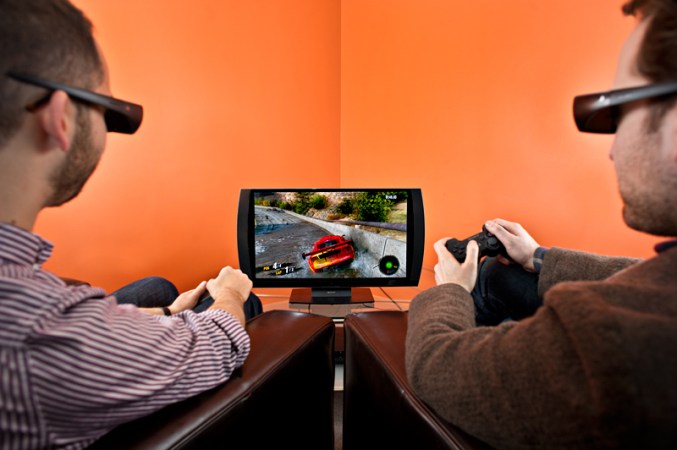

We may earn revenue from the products available on this page and participate in affiliate programs. Learn more ›

In our February issue, _Popular Science explores the Future of Fun. Here on PopSci.com, we’ve teamed up with the video game experts at Kill Screen to bring you a week-long special feature exploring the unexpected ways we have fun with games today—and how what’s even considered a “video game” is ever-changing._
In our first feature this week, Kill Screen’s Filipe Salgado pulls together five web-based Flash games (all playable right here) that showcase this new creativity.
On November 8th, 2011, Activision released the latest entry in the popular Call of Duty series, Modern Warfare 3. It sold 6.5 million copies in its first day, and stands as the highest-grossing entertainment launch of all time. The game was well received, but in almost every review a lack of innovation is brought up. The game iterates instead of innovates. It still remains a military shooter set in a present-day conflict. Its look and the way you play it remain largely the same as its predecessors. Big explosions and big setpieces, like videogames Michael Bay would make. And why change? With a budget in the millions, there is little room for experimentation. Game makers have found a recipe that sells well. Deviating from it can only hurt.
While big-budget games get further entrenched in big returns and big budgets, a lot of innovation has shifted to the internet. Developers, by themselves or in small teams, have turned the small scale of the browser into an asset, creating little Flash-based distractions that don’t have to worry about commercial viability, and that innovate excitingly, either through theme, subject matter, or game play. They work outside the system. And the best part? They’re all free.
PoleRiders

If you don’t know Bennett Foddy by name, perhaps you’ve played his games, or at the very least, had an overzealous aunt forward you the link. The Oxford professor’s first game, QWOP, has been played by millions. While walking is one of the most basic activities in a typical game, QWOP turns it into a daunting challenge. You play a track runner, and use four keys to control each of his calves and thighs separately so he can move down the track. It’s even harder than it sounds.
His latest project, PoleRiders, is a two-player game involving competitive combat pole vaulting. A ball is suspended above the players’ heads. The goal is to pole vault and hit it into the opponent’s castle to score a point. Another case of easier said than done. The left and right keys control the players legs, but up and down control the pole. The fast and frantic play harkens back to competitive arcade game classics like Joust. The counter-intuitive controls create panic and chaos enough that newcomers can laugh with their friends when they accidentally land on each other’s pole, and that seasoned players can enjoy as a genuine game of skill.
“It’s definitely true that mainstream videogame publishers have made a radical, drastic push towards making games easier and less frustrating.” But Bennett Foddy has been frustrating millions of players for years.
“I think of my games as being incredibly hostile to the player, but I hope they are also respectful of the player.” says Foddy. “For me personally, frustration is part of what I want out of a game. Without that slowly building feeling of frustration, and subsequent relief, there would be no sense of mastery. And that sense of mastery is, I think, one of the most valuable things a skill-based videogame can offer the player.”
Sweatshop
Flash games have the ability to tax not only a player’s skill, but also a player’s principles. In Sweatshop, an educational game from Littleloud, you place workers on the assembly line to make clothes. Water coolers and repairmen are costly necessities to be placed sparingly. Your desire to save money and get a high score puts your workers at risk. As time goes on you start to realize that the urge to do well in the game is at odds with your compassion.
Oiche Mhaith
Oiche Mhaith, by developers Terry Cavanagh and Stephen Lavelle, has you playing a young girl. Her mother is overbearing and abusive, her father ignores her, and her dog doesn’t like her. When she retreats into her room, she takes out the abuse onto her pet doll. When her family dies, she tries to resurrect them using a computer program. Following the girl’s wishes, we’re complicit in her quest. Even if we think she’s better off without her awful family, playing the game makes us accomplices in the cycle of abuse she’s a part of.
Both Oiche Mhaith and Sweatshop ask the player to take an active part in something they might object to, just to progress and get some closure. These games aren’t as disposable as simple games of desktop solitaire. Although they take as much or as little time, they cannot be shrugged off as casual diversions. They make you think about them long after you’ve finished playing.
One Chance
One Chance, by the artist “Beans,” also deals with mature subject matter, but allows for more freedom. Many games offer moral choices, but the choices themselves tend to feel simplistic and flatten morality into an easy and obvious good-and-evil pet-or-kick-the-puppy dichotomy. One Chance’s choices are more ambiguous. You play as a scientist who ends up creating a lifesaving vaccine with an unforeseen deadly side effect. Each day you’re given a choice of what to do. You can walk to your car and go to work. Try to work on a cure that might not come? Spend time with your family? Have an affair with a co-worker? All the choices are tinged with the underlying question: how would we spend our last days on earth?
Another problem with moral choices is that restarting a game can undermine their impact. Uniquely, One Chance doesn’t allow players to restart. Try playing again after reaching an ending and you find that it’s not possible. Whatever ending you received the first time is the ending you’re stuck with, its static image lingering every time you try to restart the game.
Realm of the Mad God
Years ago the thought of creating an independent massively multiplayer game would be laughable. It was a genre reserved for the big leagues. World of Warcraft, the most popular massively multiplayer game, has over 10 million subscribers, with each player paying a monthly fee, and has been the subject of a South Park episode.
When Rob Shillingsburg and Alex Carobus started Wild Shadow Studios after leaving Google in 2007, they decided to go big right away with Realm of the Mad God. Big studio games like World of Warcraft or Everquest demand large amounts of the players’ time to learn all the nuances and methodically increase characters’ power. Shillingburg and Carobus wanted to make their game as easy to get into as possible.
“We picked Flash as the client platform for two related reasons. First, it had the greatest reach: 99 percent of computers have Flash installed (compared to 73 percent for Java, for example). Second, it runs in the browser so players could simply navigate to a web page and start playing. There was no need for any software to be installed on the user’s computer.” Carobus says.
The game is also tremendously flexible. Anybody can play the game right away. It plays fast too, with arcade-like controls and less reliance on grinding, or repetitive gameplay, to advance a character. Characters die and stay dead. If World of Warcraft is a long marathon, Realm of the Mad God is a sprint. All of these features go against the conventional wisdom of the genre, which demands a slow and steady approach, yet they have been able to attract and keep an audience.
Carobus says, “WoW is like a Hollywood blockbuster. It has a huge budget and a huge number of people working on it and generally polishes and revises an established formula until it is very refined. RotMG is like an indie movie. We have a tiny budget and small number of people so it may not impress with its special effects, but competes instead by showing you something you haven’t seen before. “
Like all of these developers, Wild Shadow works in the shadow of the big developers. But their small scale makes them agile, able to try new things and offer unique experiences. That, rather than following in the footsteps of Hollywood-style behemoths, may be the direction to the future.






